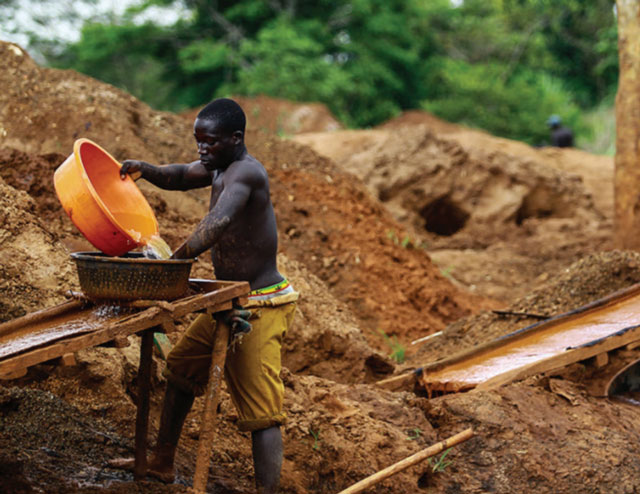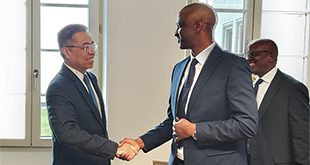
The plan, she said, is to build a separation plant, where raw ore will be processed to get phosphate concentrate. The phosphate concentrate will go to the fertiliser plant to manufacture organic fertiliser while the iron concentrate will be sent to the steel mill to produce steel.
Should the phosphates factory be commissioned this month, it will be added onto the US$ 30 million ceramics factory that was opened by President Yoweri Museveni in Luweero in September and the three cement factories (grinding stations) that were also launched early this year in eastern Uganda. These feed the narrative that Uganda’s mineral sector is ready for takeoff.
This is exactly what Zachary Baguma, the interim head at the Directorate of Geological Survey and Mines told the delegates during the opening of the conference on Oct. 2.
Baguma said Uganda’s numerous metallic minerals including; copper, cobalt, tungsten, beryllium, columbite-tantalite, gold, lead and zinc, lithium, tin, iron ore, platinum, uranium and rare earth metals alongside vast deposits of industrial minerals such as; marble, limestone, phosphate, vermiculite, kaolin, bentonite, diatomite, glass sands, salts, pozzolona, dimension stones and gemstones lying underground in millions of tonnes could fetch the country as much as US$ 20,437 billion as per the directorate’s total reserves value of the minerals.
Baguma said the country has high potential for economic minerals and the recently concluded geological survey and airborne geological surveys revealed more mineral resources and targets for gold, iron ore, platinum, nickel, uranium and bentonite.
Positive results
Yet, judging by talk from some of the executives of exploration companies already doing work in the field, it appears Uganda should even be earning millions of dollars from exploration activities alone.
Jennifer Hinton, the director East Africa Operations M2Cobalt, an exploration company that is exploring cobalt in various parts of Uganda told The Independent that her company is so far excited about the results they have found.
M2Cobalt has exploration licenses through Ugandan affiliated companies in Mityana, Mubende, Kasese, Kiboga, and Bunyagabo straddling over 16,000 sq km.
“We have had positive results to invest more money and continue to explore and identify more areas to quantify results,” she said.
But she also tempered the Ugandans’ expectations noting the risks that usually come with mineral exploration. Hinton said on the international mining scene, only about one in 10,000 projects actually develops into a fully-fledged mine.
“Because of the risks involved in exploration, you can get positive results in say, 58 out of 60 steps and at step 59, you realise that the project is not feasible,” she said, “But we are taking a risk on Uganda and as we continue getting good results, we will continue investing here.”
Hinton told The Independent that the company’s challenge so far has been uncertainty in Uganda’s mining industry.
“You don’t want a royalty or tax provision that changes in three years after you have built an economic model,” she said, “When you think of international investors, they will take their money where there is predictability and certainty in addition to geology.”
But she quickly noted that the ongoing policy and legal reform process is quite progressive in terms of encouraging both local and foreign investors.
“Basically what we need is certainty, predictability and fairness. If you have a license, you want to be sure that it will not be cancelled unjustly,” she said, “The current legislation actually has mechanisms for that but I know that the new one will be stronger and I find that exciting.”
“The current legislation is clear procedurally but if I were to complain, it would have to be about import tax on exploration equipment because when you are investing in exploration, you are not making any money really,” she said, “Until you find anything, you don’t make any money. We pay a lot in bringing this equipment here.”
For Alain Goetz, the Chief Executive Officer of African Gold Mining Refinery Limited, eastern Africa’s only gold refinery, one of the things that need to fall into place is probably the “negative press and civil society” which have made his gold refining business in Entebbe a bit hard at times.
He also finds the certification of minerals like gold coming out of the Great Lakes region of Africa more “theoretical and quite cumbersome” for the hundreds of thousands of illiterate miners in the region.
“We want to have a system which is more practical, cheaper and is easy for African miners to operate,” he told The Independent.
For Nicolas George, the Chief Executive Officer of Hima Cement, a subsidiary of Lafarge Holcim, a French cement conglomerate, Uganda’s tax environment is always not in favour of local manufacturing or mining companies.
George explained that, for instance, Hima’s unique large scale cement integrated plant in western Uganda which uses local raw material is subject to higher tax/royalties than simple grinding plants which transform imported semi-finished products.
By the end of the conference, Richard Kaijuka had seen the challenges that the government needs to confront head on to make Uganda’s mineral sector roar.
“We are convinced that once Uganda invests in thorough exploration, world class discoveries would be made,” he said, “If we have value addition on the selected 10 minerals cluster, the potential and income generated for Uganda would exceed what we expect from oil and gas.”
Meanwhile, Rio Tinto was last in Uganda in 2007 when it attempted to invest in Uganda’s vermiculite in eastern Uganda.
Half a century earlier, it had also shown interest in Uganda’s copper in western Uganda. On both occasions, however, Rio Tinto exited the country quietly. This time, many hope it will stick around for some time.
 The Independent Uganda: You get the Truth we Pay the Price
The Independent Uganda: You get the Truth we Pay the Price


